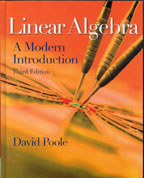Linear Algebra
Syllabus
Instructor: Cary Lee, Ph.D.
Office: Techmall 70-211
Telephone: 644 -7894
Office Hours: Mon, Wed 12:30 - 1:30pm,
T,Th 12:30 - 2pm
e-mail: cary.lee@gcccd.edu
website: http://www.grossmont.edu/people/cary-lee/default
Linear Algebra Roughly speaking, linear algebra is the study of an algebraic structure consisting of a set together with a notation of "linear combination" of its elements, and more of a "linear transformation" between two such structures. In particular, an equation is called linear if it is of degree one, and for a linear equation with only one variable, its graph is a line, hence the term "linear".
This subject is useful because it is suited for dealing with a large percentage of real world problems that are either linear or regarded as almost linear. We shall see some concrete examples in the first few chapters and then move on to the more abstract objects and concepts in this field.
Textbook:
|
Linear Algebra third edition Brooks/Cole |
 |
PowerPoint Lecture Notes
Course Prerequisite: The basic requirement is a grade C or better in Math 280, but the successful completion of Math 245 will be recommended.
Calculator requirement: You will need a calculator or computer software that can perform moderate to advanced matrix operations to survive in this class. The reason is that most homework and exam questions will require large amount of calculations which cannot be performed by hand in the given time period.
The TI82, 83, 86, 92 or more advanced version will work. You will get better results if you have access to the softwares Maple, Derive, or Mathematica etc. (These should be available in our Math Study Center, please go there and ask.)
Grades: This course is offered for a grade of A, B, C, D, or F. The grade distribution is as follows:
| A | ......... | 90 - 100% |
| B | ......... | 80 - 89% |
| C | ......... | 70 - 79% |
| D | ......... | 60 - 69% |
| F | ......... | 00 - 59% |
Assignments:
| 5 short quizzes @25 pts | 125 |
| 2 one-hour exams @100 pts | 200 |
| Final Exam | 150 |
| ________________________________________ | |
| Total | 475 |
Homework will be assigned at the end of each class meeting, and if you are eager to do the exercises in advance, you can get the assignment from the next webpage (see top of page).
Expectation of Students:
Academic Integrity:
Any student who cheats on any of the tests, or disrupts the class or hinders the progress of any other student will be dropped from the class, and his/her misconduct will be stored in Grossmont College's record.

8800 Grossmont College Drive
El Cajon, California 92020
619-644-7000
Accessibility
Social Media Accounts